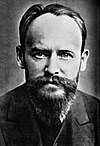Portal:Bavaria/Selected biography
Selected biography 1
Portal:Bavaria/Selected biography/1 Rainer Werner Fassbinder (31 May 1945 – 10 June 1982) was a (West) German film director, screenwriter, dramatist and actor. A premier representative of the New German Cinema, Fassbinder distilled elements of his sources — Brechtian theatrics, Artaud, the Hollywood melodramas, classical narrative, and a gay sensibility.
He maintained a frenetic pace in film-making. In a professional career that lasted less than fifteen years, Fassbinder completed 35 feature length films; two television film series; three short films; four video productions; twenty-four stage plays and four radio plays; and 36 acting roles in his own and others’ films. He also worked as an actor (film and theater), author, cameraman, composer, designer, editor, producer and theater manager.
Underlying Fassbinder's work was a strong provocative current. His phenomenal creative energy when working were in violent contrast with a wild, self-destructive libertinism that earned him a reputation as the enfant terrible of the New German Cinema, as well as being its central figure. He had tortured personal relationships with the actors and technicians around him who formed a surrogate family. However, his pictures demonstrate his deep sensitivity to social outsiders and his hatred of institutionalized violence. He ruthlessly attacked both German bourgeois society and the larger limitations of humanity.
Selected biography 2
Portal:Bavaria/Selected biography/2

Rudolf Christian Karl Diesel (German pronunciation: [ˈʁuːdɔlf ˈkʁɪstjan ˈkaʁl ˈdiːzəl]; March 18, 1858 – last seen alive September 29, 1913) was a French/German inventor and mechanical engineer, famous for the invention of the diesel engine.
Diesel was born in Paris, France in 1858 as the second of three children to Theodor and Elise Diesel. Diesel's parents were German-born immigrants living in France. Theodor Diesel, a bookbinder by trade, had left his home town of Augsburg, Kingdom of Bavaria, in 1848. He met his wife, Elise Strobel, daughter of a Nuremberg merchant, in Paris in 1855 and himself became a leathergoods manufacturer there.
Selected biography 3
Portal:Bavaria/Selected biography/3

Richard Georg Strauss (11 June 1864 – 8 September 1949) was a German composer of the late Romantic and early modern eras, particularly of operas, Lieder and tone poems. Strauss was also a prominent conductor.
Strauss was born on 11 June 1864, in Munich, the son of Franz Strauss, who was the principal horn player at the Court Opera in Munich. He received a thorough, but conservative, musical education from his father in his youth, writing his first music at the age of six. He continued to write music almost until his death.Selected biography 4
Portal:Bavaria/Selected biography/4

Christian Morgenstern (May 6, 1871 in Munich– March 31, 1914 in Meran) was a German author and poet from Munich.
Morgenstern's poetry, much of which was inspired by English literary nonsense, is immensely popular, even though he enjoyed very little success during his lifetime. He made fun of scholasticism, e.g. literary criticism in "Drei Hasen", grammar in "Der Werwolf", narrow-mindedness in "Der Gaul", and symbolism in "Der Wasseresel". In "Scholastikerprobleme" he discussed how many angels could sit on a needle. Still many Germans know some of his poems and quotations by heart, e.g. the following line from "The Impossible Fact" ("Die unmögliche Tatsache", 1910):
- For, he reasons pointedly / That which must not, can not be. (German: "Weil, so schließt er messerscharf / Nicht sein kann, was nicht sein darf.")
Selected biography 5
Portal:Bavaria/Selected biography/5

